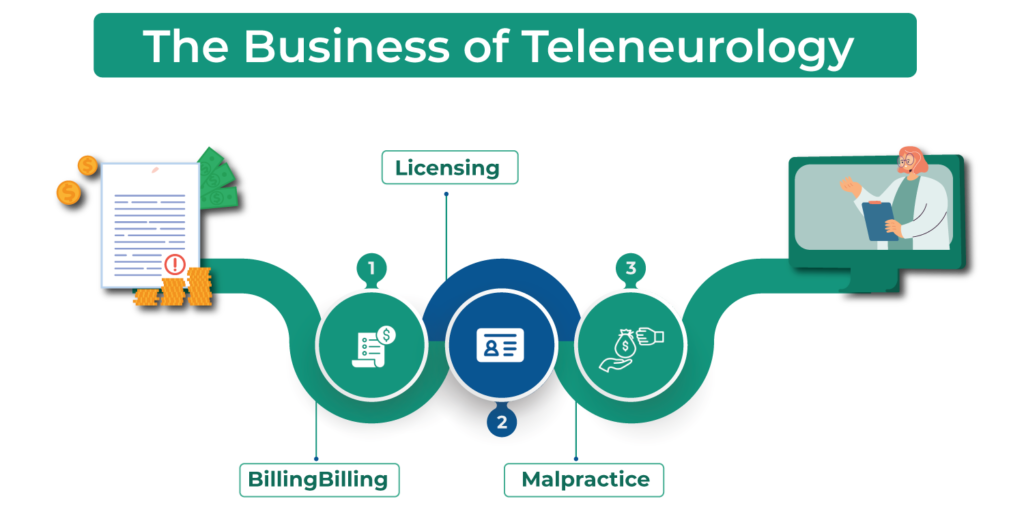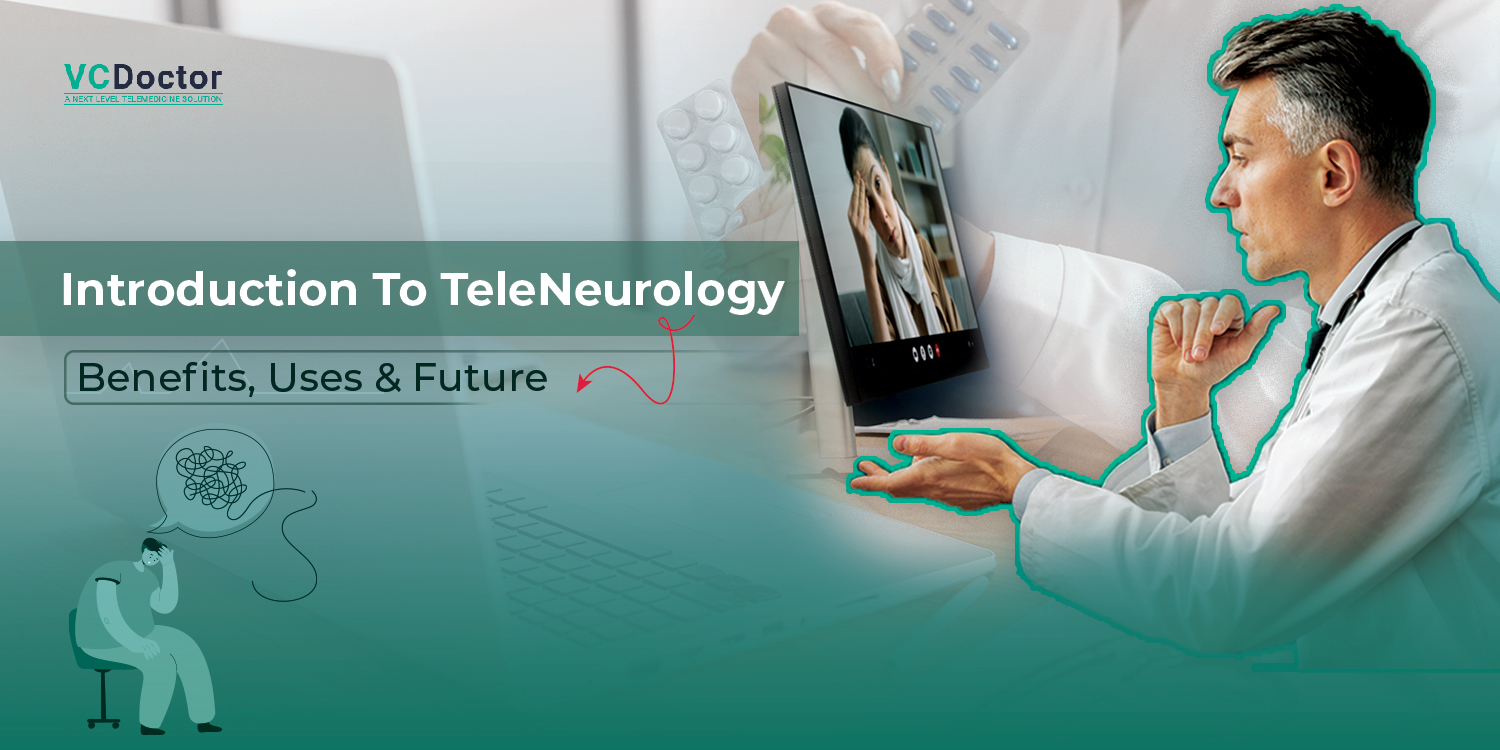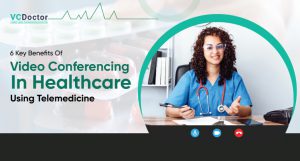Introduction to TeleNeurology: Benefits, Uses & Future
Feeling unwell and needing to see a neurologist? But the thought of traffic and crowded waiting rooms making you groan? Teleneurology might be your answer!
Teleneurology services are changing how patients access neurological care. With just a simple telemedicine app on your phone, you can discuss your symptoms with an expert.
And not just consultations, patients can also get e-prescriptions, manage their health records, and more using a telemedicine platform for patients. Providers too enjoy a slew of benefits that traditional care models can’t.
Using a telemedicine platform for neurology gives providers a certain edge. They can see patients remotely, saving potential time and resources. But more than this, they can use teleneurology services to streamline their workflows, integrate EHR systems, and even scale their practice beyond their clinic or hospital.
We will discuss all the benefits of teleneurology services, the future of telemedicine platforms, and more in this blog.
Table of Contents
- What is Teleneurology?
- Benefits of Teleneurology
- Is Teleneurology Ideal for You?
- The Business of Teleneurology
- What does The Future Hold for Teleneurology?
- Why Choose VCDoctor’s Telemedicine Platform For Providers?
- Conclusion:
- FAQs
What is Teleneurology?
Teleneurology is a branch of telemedicine that focuses on providing neurological care remotely. Imagine it as a way to consult with a neurologist without actually being in the same room.
Consultations typically happen through a secure teleneurology platform. Patients and providers can connect using a computer, tablet, or even smartphone.
Providers can use teleneurology solutions for the following:
- Discuss symptoms and medical history
- Perform a visual examination, observing movements and facial expressions
- Review any medical scans or test results
- Provide a diagnosis and treatment plan
Benefits of Teleneurology
Here we have mentioned some of the benefits of teleneurology, which are as follows
Remote Diagnoses
Telemedicine itself is medication-led and a ways off. Meetings are not finished face to face. An analysis is done from a distance. The idea isn’t extremely new. It dates to around 1969. What has changed is that innovation permits judgments to be led over a phone or through a webcam. These innovations permit the limits of existence to fall away, making it quicker for specialists to analyze patients and for patients to get to those judgments with speed not known before the improvement of telemedicine.
Numerous clinical claims to fame utilize telemedicine. Radiologists, pathologists, and dermatologists have been making use of telemedicine for some time, generally due to visual reports and patient imaging requirements. Telepsychiatry services has started to prosper. Patients can speak with less dread when they can lead a meeting with their PCP through the Internet. Teleneurology has started creating in a far and wide way as of late.
Potential Uses For Teleneurology Services
Teleneurology services are separated into care that is clinician started or patient started. Either party can exploit the use of telemedicine equivalent to telecare or telehealthcare because it is an innovation that permits an immediate, confidential exchange among specialists and patients. The term is fairly erratic as specialists and patients are fit for being described as natives of Marshall McLuhan’s “Worldwide Health Village.” That term still can’t be utilized famously for this type of care.
Nervous system science benefits from telecare because patients in remote or provincial regions can now get specialist care from specialists in significant metropolitan regions. Far-off patients might experience difficulty getting to this innovation. However, the way it is developing is verifying that before long, even exceptionally far-off patients will approach this basic type of earnest consideration.
In certain discussions, a clinical expert attempts to survey the patient face to face. This happens while another clinical expert, typically the nervous system specialist, sees this from a distant area through a video connection. The Internet-based nervous system science discussions are suitably archived. With specialized help, the teleneurology counsel process analyzes the patient, and a treatment plan is conceived.
These teleconsultations can make emergency clinic stays more limited. Patients in some cases stress over security, yet by and large, it is the specialist’s or alternately emergency clinic’s obligation to guarantee no break of protection happens, which is the situation with conventional clinical records. An unmistakable benefit of these virtual nervous system science conferences is a decrease in the movement of telemedicine for doctor and patients. With less travel, there is, to a lesser extent, a carbon impression made on our planet.
Furthermore, it is more achievable for relatives to go to teleconsultation. This is great for patient help and for precision in getting the patient family ancestry. Aptitude from experts is gotten to regions truly ineffectively served by nervous system science experts.
Email Consultations
There are two connections utilized in telemedicine. One is the simultaneous connections or continuous discussions. The other is “store and forward” joins or nonconcurrent joins. Messages are offbeat connections as they store the data in a conference and forward it to the legitimate nervous system specialist. This saves time for both patients and specialists. The UK’s Data Protection Act oversees secrecy in email meetings.
Medical clinics and specialists should stick to great practices concerning email. It is important to guarantee all messages are replicated to all gatherings included. They should likewise be remembered for clinic notes and records. If different medicines are engaged with a counsel, the notes regarding these medicines should likewise be thorough and put away appropriately for access later.
The General Medical Council in the UK has given rules for distant solutions, and emergency clinics should safeguard their tight PC framework with secure information reinforcement. The UK General Medical Council has given rules on this, far-off solutions, and keeping in touch with data.
Is Teleneurology Ideal for You?
Whether you’re simply beginning in your clinical profession or you’ve been rehearsing for quite a long time, teleneurology could be a solid match. To find out, you’ll need to think about some of these parts of the work.
Hardware and space
For the occasion, teleneurology solutions can be principally directed from the professional’s home space. However, that could change assuming associations in the future select to offer the types of assistance from blocks and-mortar areas. To be prepared for locally situated counsels, you’ll require sufficient protection to guarantee patient secrecy and continuous meetings, as well as satisfactory broadband and the relating PC gear. Having attempted various designs — including a disastrous treadmill work area — Anderson has found his best arrangement incorporates a huge 42″ video screen that gives better visual sharpness while working with patients.
Solo or employed?
Might it be said that you are hanging out a shingle or conveying a resume? The two choices are accessible to you, yet the subtleties will matter. As an independent expert, you’ll be liable for the charging, for instance, and for guaranteeing credentials with client medical clinics. Yet, you’ll likewise have full power over your timetable and work. Then again, as the worker of a telemedicine organization, you’ll exchange a portion of that independence, and perhaps a portion of your pay, to serve to have another person mind the managerial subtleties.
Subspecialty
As per Jones, a few claims to fame, like migraine and stroke, may be particularly versatile to teleneurology processes, while others expecting face-to-face methodology or assessments may be less manageable. Anderson noticed that a large portion of the parts of face-to-face care esteemed by nervous system specialists would be conceivable on the web, no matter the discipline. “At the point when we consider nervous system specialists, to us, there’s been somewhat of a split between crisis, nervous system science and short term nervous system science,” he says. “We didn’t use to have stroke treatment; however, presently, with all the crisis medicines we can give, there’s this branch that is all go-go rather than how about we celebrate on this. I feel that what’s wonderful for nervous system specialists — being a cycle of an investigator and concocting a telehealth solution for patient — that is not missing with teleneurology solutions, however many individuals figure it will be.”
The Business of Teleneurology
Although the tele-part of this assistance conveyance model gets the vast majority of the consideration, virtual primary care can’t occur if the managerial side isn’t made due. Boss among the issues is charging, permitting, and risk.

Billing
The discussion about billing can be complicated in any medication part, particularly when you add a new method of administration conveyance. With their expert help, authorities dove into the issue of charging as it connects with telemedicine. At the same time, the 2018 FAST Act addressed a gigantic jump forward by guaranteeing value in repayment for telestroke, eliminating the primary obstruction to emergency clinics offering the support. Then again, after over a year, it has been noticed that the exceptional parts of telemedicine make similarly special issues —for example, the turmoil brought about by certain guarantors charging from where the specialist is situated while others bill from the patient’s area. At the same time, not a solitary one appears to involve similar codes for the work.
Licensing
It’s conceivable that future doctors will consider the licensure issue to be one of the developing agonies for telemedicine. By what other method could you depict the aftereffect of Elaine Jones’ work — licensure in an eye-popping 21 states and then some? Since doctors in the United States should look at present hold licensure for the state where their patient is “seen,” telemedicine specialists have barely any choice yet to heap on the licensures — and the orderly charges and CME prerequisites. Emergency clinic credentialing adds to the administrative work tangle, with most frameworks requiring yearly restorations that the doctor should either start or, if nothing else, audit and prove, contingent upon whether they work for an office or themselves. For Jones’ situation, licensure in 21 states means 150 credentialing associations, none of which is on a similar yearly timetable for handling reestablishments. Maybe it’s no big surprise that one of the gatherings she’s decided to assist with at SOC Telemed is the credentialing board of trustees she seats.
Malpractice
Somehow or another, this may be the most straightforward regulatory balls to shuffle since the doctor’s transporter or intermediary, for the most part, starts to lead the pack on the cycle. All things being equal, Anderson cautions that the teleneurologist ought to go to in any case, focus on the subtleties. For instance, he modified his training when his agent urged him that conveying misbehavior in certain states was more costly than in others. He additionally discovered that only one out of every odd transporter would cover each state, which might make one more arrangement of choices for the specialist.
What does The Future Hold for Teleneurology?
After requiring a long time to arrive at its ongoing degree of acknowledgment, teleneurology, at last, appears to be ready for a significant jump forward. A powerful coincidence of situation energizes the new burst: The close to general admittance to top-notch gadgets for professionals and a cell phone for patients. The leap forward in charging valuable open doors addressed by the FAST Act. The COVID-19 emergency requests the exceptional requirement for locally established administrations.
It’s the second that Anderson, Jones, and thus many of their partners have been working towards as they ideal the method involved with conveying medical care from a distance.
“I continue to figure there may be a re-visitation of specialist controlled medication and solo practices with the COVID-19 effect,” Anderson says. “The virtual specialist shares significantly something else for all intents and purpose with the nation specialist than with the utilized specialist.”
Regardless of whether this genie could be returned to the container, Jones, for one’s purposes, doesn’t accept that that would occur. “I don’t figure it will return to where it was at any point,” she says. “I think specialists and patients have understood the accommodation of it and won’t have any desire to return. They will let it as it is and want to see how things might move when this (the pandemic) is finished. The installment framework will fall behind, influencing all the other things.”
Except if, or at least, the installment framework doesn’t make any difference any longer. With the ongoing pervasiveness of high-deductible protection plans, Anderson guesses that a few specialists could return to coordinate to-the-patient charging that benefits the two players by removing protection through and through. “If you don’t have a physical activity to fund, is there any valid reason why you wouldn’t simply charge the patient their co-pay sum rather than going through the protection? It’s a similar expense for the patient, and you can bear to charge less if you don’t have the above.”
Charging issues to the side, both Jones and Anderson are hopeful about the future of teleneurology. “It’s an intriguing opportunity to be a nervous system specialist,” Jones says. “Nervous system science has truly driven the way with telemedicine in any case, even before this. I suppose on the off chance that we keep on developing, we will be an extraordinary shelter to our patients and to medication. We will be out there contending energetically for it to remain.”
Why Choose VCDoctor’s Telemedicine Platform For Providers?
If you are a neurologist who wants to offer teleneurology services for patients, the first step would be finding the right platform. When choosing one keep the following factors in mind:
- App navigation: It should be straightforward. Patients should be able to access your services and book and manage appointments with ease.
- Advanced Features: It’s important to look for features that help your practice grow. This could include AI chatbots, EHR integration, Patient health and wellness reports, etc.
- Data compliances: If you are a provider in the USA, it’s essential to use a HIPAA-compliant telemedicine platform. It will ensure that the app data is secure and well-protected, protecting you from unwanted fines or penalties in the future.
You can find all the above factors and more in VCDoctor!
Our telemedicine platform for clinics and hospitals is 100% white-label and customizable. You can get started with teleneurology services in weeks. Plus, we take care of all future needs- including timely updates, security audits, feature add-ons, and more.
Conclusion:
This is all about teleneurology, from its benefits to its uses and future. if you are a neurologist willing to incorporate teleneurology services into your practice. Then you can avail best telehealth platforms from renowned telehealth solutions provider firm VCDoctor.
We offer the world’s best telemedicine platforms for doctors that are white-label, all-inclusive, ready-to-use, and HIPAA-compliant solutions. Employing VCDoctor telemedicine solution for doctors lets you bring your healthcare facility online in no time, and you can start teleneurology services with your concerned patients anytime, anywhere.
FAQs
1. What happens if a provider cancels appointments in the platform?
In such a case, the patient or provider can reschedule the appointment. Depending on the available slots on the provider’s calendar, the appointment can be rescheduled. The calendar can be viewed by both the patient and provider.
2. DO patients need to pay again for rescheduled appointments?
Since the payment is already done, there is no need to pay for reschedules. If no rescheduled is done, the amount is transferred back to the patient, registered account.
3. Is patient and provider transaction data (including card details) safe?
Yes, all data, including payments, is safe on the platform. The payment gateways we support are credible and maintain the highest level of security.
4. How can I book a VCDoctor demo?
You can do so easily. Simply visit our contact us page and share your details. Our expert will get in touch and book a demo date and time for you.




